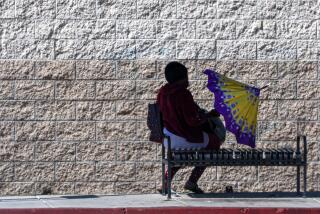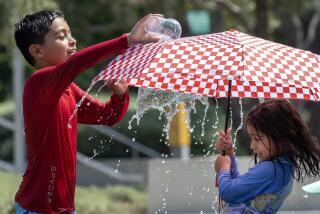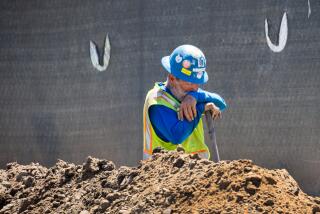Growing up in the California heat — and learning to love it
- Share via
We are good at this — the handling of extreme heat in California, weeks when the temperature rises to 108, 109, 111, even 114, for four days, five, 10. We were children of the hottest late-summer days, and now we are parents of children and grandchildren whose foreheads sparkle with beads of sweat like sequins pasted there for decoration.
We are children who grew up without air conditioning, who grew up playing sports in the heat, riding bikes and skateboards down street shimmering with the mirages of asphalt rivers, climbing the foothills where even the blue-throated lizards didn’t move quickly from the rocks where we put our hands. When it is this hot, I lie on the cement porch outside at night, and the darkness floods with memory.
It was so hot some summer days in the late 1990s — when my wooden bungalow in Riverside still had no air conditioning — that big, green fig beetles died flying in the air, and golden baby lizards slipped under the screen door of my 100-year-old house to sleep in shoes deep in our old-fashioned closets that had their own windows.
Back then, when my three girls couldn’t sleep in the heat, I would put two sheets outside on the grass around 11 p.m., and we’d lie in the yard, staring at the impossible blue of the night. In my first years in this house, I planted a seed packet of Italian sunflowers — all colors, from white to lemon yellow to buttery gold to deepest red. Then the sunflowers hybridized and came up from new seeds every year, growing to 20 feet tall around the fence to hide us. At night, yellow finches, hot from the day, would hang upside down on the seed heads, and their chirps would fall all around us where we lay.
My girls were small back then. Gaila was 8, Delphine was 6, and Rosette was 2. When they finally fell asleep — and I never knew which girl would stay awake the longest — I’d lie there on the grass thinking about how we would survive the next day.
But I was born to this heat, too. In the 1970s, my siblings and I ran barefoot on the blistering sidewalks of Riverside with neighbor kids, goading each other until the soles of our feet felt nothing, the calluses and dirt on them as thick as though they were the black rubber treads of sandals. We panted in the shade of granite boulders and stumbled past rattlesnake dens where even the reptiles were stunned and quiet. We drank hot water from old, green, rubber hoses. I will drink from a hose even now, this terrible summer of 2020, because growing up like that, and raising my daughters like this, taught us to be thankful we had the hose, the house, the water and each other.
I was married on a day in August 1983 when the temperature reached 108. We wore long-sleeved wedding attire and gathered with 225 guests in the Allen Chapel African Methodist Episcopal Church in Riverside, the oldest Black church in the area, founded in 1875.
We sweated bullets, as my father-in-law said. After the reception, Dwayne Sims, my new husband, and I got in a borrowed Cadillac, with my maid of honor, Laureen Morita, and our best man, Dwayne’s brother General, and we were driven around Fairmount Park’s still, silver lake. The car’s horn was broken, so General rose through the sunroof and shouted, “Honk, honk, damn it, these people just got married!”
My brother-in-law had just given us the wedding toast, made brief by the heat and too-warm champagne: “Like the Bible says, y’all, be fruitful and multiply.” Our daughters always rolled their eyes at this story.
Two of my daughters are here this August and September, the heat wave heightened by COVID-19 and quarantine and fires and smoke. Delphine and her husband, Kunmi, left behind smoke and ashes in the Bay Area to celebrate Rosette’s 25th birthday. With our dog, Angel, a flat-coated retriever with long, black, shaggy hair, we like to walk the sidewalks of our neighborhood in the dark, passing the same grass and trees, now decades later. The descendants of those same sunflowers are also holding finches dangling upside down and calling to us.
We laugh when people say California is over, that it is foolish to live in a place of such extreme heat, fire danger and too many dreams. When others would flee, we dream of the deepest cerulean blue we will see tonight, between the branches above us, of the lizards creeping toward our high heels in the cool closets, of the rivers of crows flying above us at dusk, beaks open to catch the air cooling just out of our reach.
Susan Straight is the author, most recently, of the memoir “In the Country of Women,” from which this essay is adapted.” She is a novelist and professor of creative writing at UC Riverside.
More to Read
A cure for the common opinion
Get thought-provoking perspectives with our weekly newsletter.
You may occasionally receive promotional content from the Los Angeles Times.









